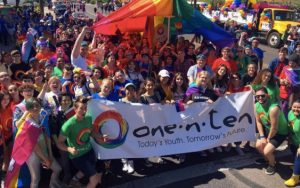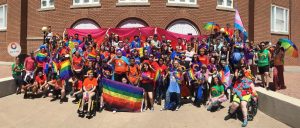- Slug: BC-CNS COVID and LGBTQ, 1,110 words.
- 2 photos available.
By Haley Lorenzen
Cronkite News
LOS ANGELES – Higher rates of asthma and other health issues among LGBTQ people are adding to the unique mental and physical stresses the community faces during the COVID-19 pandemic.
The primary symptoms of the disease are respiratory. The Centers for Disease Control and Prevention recommends those with moderate to severe asthma take extra precautions, stating, “COVID-19 can affect your respiratory tract (nose, throat, lungs), cause an asthma attack, and possibly lead to pneumonia and acute respiratory disease.”
In 2018, according to a recent report by the Human Rights Campaign Foundation, 21% of the adult LGBTQ population in the United States had asthma, compared with 14% of the non-LGBTQ adult population. In addition, the report said, LGBTQ Americans also are much more likely to smoke every day.
Asthma and smoking may exacerbate symptoms of COVID-19, the CDC said.
“We don’t really know why there is a higher prevalence rate of asthma among LGBT people,” said Dr. Dona J. Upson, a pulmonologist who is a co-chair of the American Thoracic Society’s LGBTQ and Allies Interest Group.
The aim of the society, which was founded in 1905, is to advance research and improve public health regarding respiratory disease, sleep disorders and other critical illnesses. The Interest Group, which was formed in 2010, addresses the specific needs of the LGBTQ community, such as consistent access to care, the lack of which can be a challenge in detecting and treating COVID-19.
The CDC found that 22% of non-LGBTQ youth had asthma, compared with 29% of LGBTQ youth, according to a 2017 Youth Risk Behavior Surveillance report.
“We know that queer kids and adults experience much higher levels of stress than heterosexual youth in particular, and adults,” Upson said. “So, stress can be a factor. Asthma primarily is a disease of inflammation, and we know that stress causes inflammation.”
To combat these challenges and others, the Phoenix nonprofit one-n-ten is working to provide affected LGBTQ youth with access to online resources and emergency funding.
“When you’re going through something like this, and it’s the first time in your life that you’ve lost your job, and you don’t have a supportive family, the level of anxiety is through the roof and real,” said Nate Rhoton, executive director of one-n-ten.
“We all have experienced anxiety going through this, but imagine if you didn’t have any sort of a support network and you really felt alone.”
In addition to challenges to their physical health, LGBTQ youth may be particularly vulnerable to negative mental health impacts associated with the COVID-19 pandemic, according to an April report from the nonprofit Trevor Project, which provides crisis intervention and suicide prevention for LGBTQ youngsters.
“Even prior to the pandemic, LGBTQ youth have been found to be at significant increased risk for depression, anxiety, substance use and suicidality. These risks are even more pronounced among youth who are transgender and/or nonbinary,” the report said.
Across the country, Pride festivals and parades have been canceled or postponed from the traditional dates in June. Phoenix Pride, which is held in April, was rescheduled for November, while the LA Pride Festival and Parade has been moved online. Pride events can be a source of solidarity and support for the LGBTQ community, especially for LGBTQ youth.
“Colleges closed, living situations have changed and a lot of youth have returned home to situations that may be very stressful,” Upson said. “A lot of parents and other caregivers have been very supportive of their kids, but some haven’t been. And we know that rates of depression and suicide are much higher among sexual minority kids.”
Compared with other youth, LGBTQ youth are 120% more likely to experience homelessness. Additionally, 30% of youth in foster care identify as LGBTQ, according to the Human Rights Campaign. Many LGBTQ youth may also be facing an unsupportive or abusive home environment, with 67% of these youth reporting that they have family members who make negative comments about LGBTQ people.
“We have youth that are isolated at home right now with parents that maybe don’t support them, or that don’t support their identity,” Rhoton said. “It can be an extremely alienating time.”
Robbie Cabral, 23, of Goodyear, said he’s fortunate in that respect.
“I have supportive family, supportive friends,” said Cabral, who’s a member of one-n-ten. “But I also do know that there are youth that struggle with not having families who are supportive of them.”
The nonprofit, which was founded in 1993 for LGBTQ youth ages 11 to 24, offers classes and programs, as well as housing assistance and mental health services.
On April 4, the nonprofit launched its emergency relief fund with an initial sum of $26,000, providing financial assistance, food, clothing and other emergency needs.
“In March,” Rhoton said, “we saw a lot of our particularly young adults, ages 18 to 24, losing their jobs and income. In some cases, they did not qualify for unemployment or the stimulus checks because they hadn’t been working long enough, or they were also being claimed on their parents’ taxes.
“We saw that there was an incredible need to help these young people stay in their homes or apartments, and keep their utilities on.”
Since the emergency fund’s launch, Rhoton said, it has increased to $70,000, through such corporate partners as the Virginia G. Piper Charitable Trust, fundraising and donations from individuals.
“We have been able to disperse roughly half of that back into the community in direct payments to landlords to keep youth in their homes,” Rhoton said. “We’ve also made utility payments, we’ve sent digital grocery store gift cards, gas cards, even helped with car payments where necessary to keep them employed, but really just being there for these youth at a time that they need us most.”
The emergency fund isn’t the only way one-n-ten is providing assistance for its youth. Since transitioning to online programs, the nonprofit has also expanded its program offerings.
“It’s also been a space for us to build really cool digital programs,” said Sebastian Blackwell, the satellite program manager for the nonprofit.
“We’re working on a program with some of our youth about neurodiversity in the LGBTQ community, they’ve been working on a ‘Drag 101’ program, they did a mini TED Talk series,” he said.
Rhoton said another positive to come out of the transition to online services has been accessibility.
“I think what we’re seeing is we have young people that are accessing our services now that in some cases have never been to one before,” he said.
Providing this kind of accessibility, Rhoton said, can in some cases be lifesaving.
“It’s giving them that support and letting them know that they’re not alone, and that is so powerful,” he said.
For more stories from Cronkite News, visit cronkitenews.azpbs.org.
^_+

